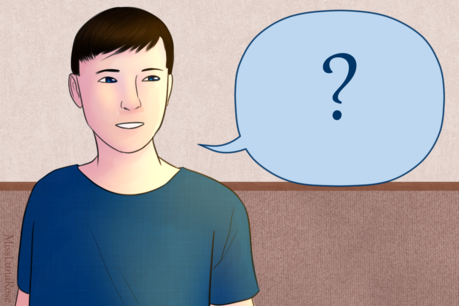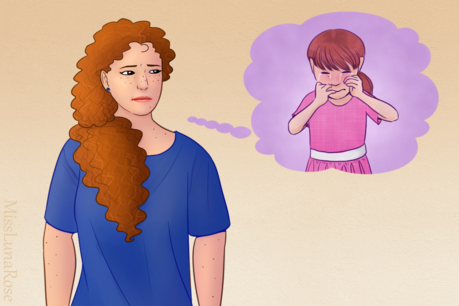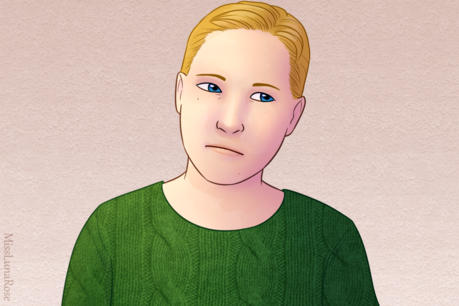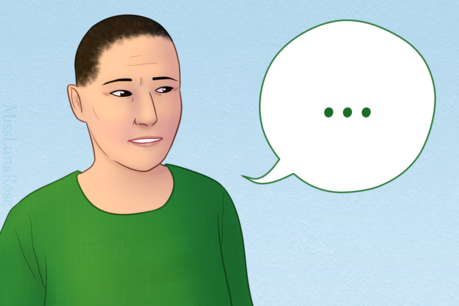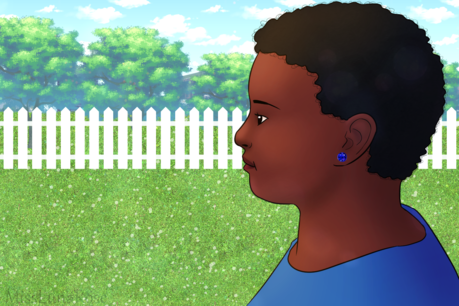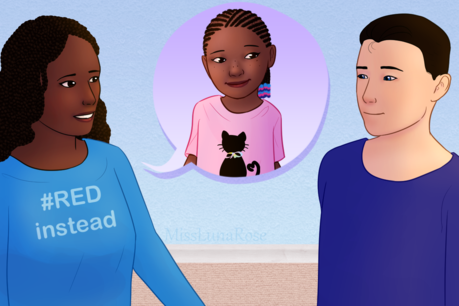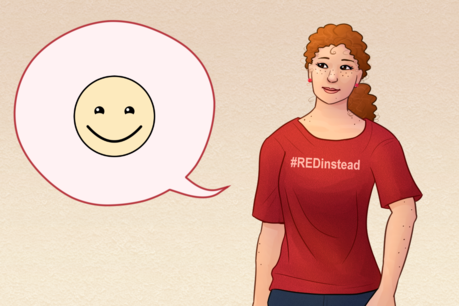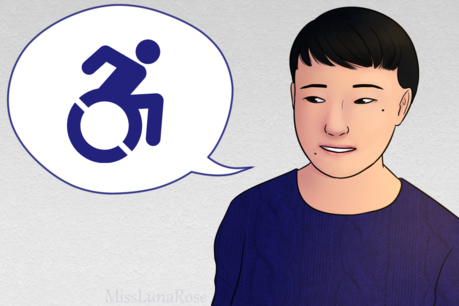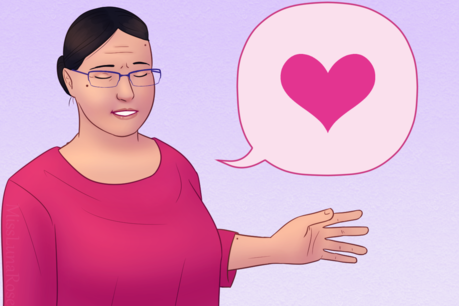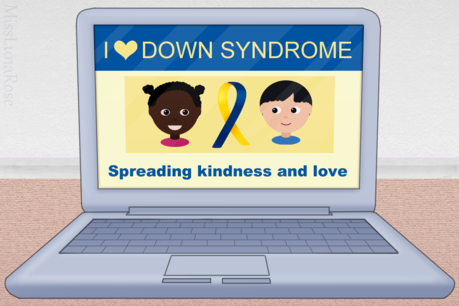How to Blog Respectfully About Your Disabled Child
Part 1 of 2:
Choosing Whether to Post Something
-
 Stop to consider your motivation. Any time you're considering posting something, it's good to take a minute to think before you act.[1] Ask yourself: Why are you posting this? What is your goal? Are you thinking about helping others, or getting yourself sympathy points at your child's expense? Be honest and consider your motivation.
Stop to consider your motivation. Any time you're considering posting something, it's good to take a minute to think before you act.[1] Ask yourself: Why are you posting this? What is your goal? Are you thinking about helping others, or getting yourself sympathy points at your child's expense? Be honest and consider your motivation.- Throwing a child under a bus, so the parent can get attention or sympathy, is always a bad parenting decision.[2][3]
-
 Consider how this might impact your child in the future. What type of judgments might people make about your child if they were to read this? Could this cause harm to your child 5, 10, or 20 years from now?[4][5][6][7] Assume that anything you write could be read by...
Consider how this might impact your child in the future. What type of judgments might people make about your child if they were to read this? Could this cause harm to your child 5, 10, or 20 years from now?[4][5][6][7] Assume that anything you write could be read by...- Future classmates (including bullies)[8]
- Teachers
- Your child's friends
- College admissions offices
- Prospective employers
- Potential boyfriends or girlfriends
- Your child themselves
-
 Think about whether you'd want anyone to write about you this way. How would you have felt if one of your parents had posted a similar story about you online? Would you be okay with that?[9] If not, don't post it.
Think about whether you'd want anyone to write about you this way. How would you have felt if one of your parents had posted a similar story about you online? Would you be okay with that?[9] If not, don't post it.- For example, you wouldn't want your family to post embarrassing baby photos, or information about your toileting habits as a toddler. Similarly, don't do that to your kid.[10]
- Think back to your worst moments: times you were drunk, foolish, sick, or in a bad place emotionally. Would you want people blogging about it and saying "this is the reality of a non-disabled person?" Of course not. Don't do that to your child either.[11]
-
 Consider whether you'd be willing to post the same information about a non-disabled child. Would you do this to a non-disabled child, or would that feel like an invasion of privacy? Remember, disabled people are just as entitled to privacy as non-disabled people are.[12]
Consider whether you'd be willing to post the same information about a non-disabled child. Would you do this to a non-disabled child, or would that feel like an invasion of privacy? Remember, disabled people are just as entitled to privacy as non-disabled people are.[12] -
 Ask how you'd feel about a teacher, therapist, or doctor posting this information about your child. Would you be comfortable with them saying these things? Or would it be weird? If it would feel like a privacy violation coming from a different adult, it's probably a privacy violation even if it's from a parent.[13]
Ask how you'd feel about a teacher, therapist, or doctor posting this information about your child. Would you be comfortable with them saying these things? Or would it be weird? If it would feel like a privacy violation coming from a different adult, it's probably a privacy violation even if it's from a parent.[13] -
 Ask the child, if you can. If your child is still small and/or not able to speak or use AAC yet, this may not be possible. But many children can answer the question "Is it OK if I write about this on my blog?"[14]
Ask the child, if you can. If your child is still small and/or not able to speak or use AAC yet, this may not be possible. But many children can answer the question "Is it OK if I write about this on my blog?"[14]- If your child says no, respect that, even if you don't understand why they feel that way.
- Try having your child read the draft of your post. They may have an opinion to share. They may even give you a great quote about their thoughts.
-
 Keep it private when in doubt. Once you put something on the internet, there's no taking it back. You don't want to put up something that you regret later. If you feel like something might be oversharing, play it safe and don't post it.
Keep it private when in doubt. Once you put something on the internet, there's no taking it back. You don't want to put up something that you regret later. If you feel like something might be oversharing, play it safe and don't post it.- You can always take a week or two to think about it.
Part 2 of 2:
Being Respectful
-
 Keep the worst stuff private. Parenting can be hard, and it's okay to have difficult feelings about your situation. There's a difference between broadcasting negative feelings online and talking privately about your struggles. Discuss your feelings with people you trust, or write them where others can't see.[15]
Keep the worst stuff private. Parenting can be hard, and it's okay to have difficult feelings about your situation. There's a difference between broadcasting negative feelings online and talking privately about your struggles. Discuss your feelings with people you trust, or write them where others can't see.[15]- Vent to your partner or a close friend (out of your child's earshot)
- Ask your child's therapist(s), or an adult with the same disability as your child, for advice
- Write in a private journal
- Attend a support group
- Talk to a counselor
-
 Protect privacy by not mentioning real names. Fake names are an easy way to protect the privacy of yourself, your child, and any other family members or acquaintances you talk about in your blog. You could refer to children by...
Protect privacy by not mentioning real names. Fake names are an easy way to protect the privacy of yourself, your child, and any other family members or acquaintances you talk about in your blog. You could refer to children by...- Initials ("E" instead of "Emily")
- Age ("my oldest," "my youngest boy")
- Fake names (possibly chosen by your child)
-
 Don't show your child's face. Avoid any photos that could show people exactly what your child looks like. People should not be able to identify your child based on your blog.[16] Here are some ways to use images while protecting your child's privacy:
Don't show your child's face. Avoid any photos that could show people exactly what your child looks like. People should not be able to identify your child based on your blog.[16] Here are some ways to use images while protecting your child's privacy:- Use stock photos or free art to illustrate your blog.
- Draw your own pictures to share.
- Show photos with no people in them, like photos of landscapes or toys.
- Only post photos where your child's face is obscured or turned away.
- Put a digital sticker (like a smiley face) over your child's face so that their features are kept private.
-
 Stay anonymous if you ask about something more private. Sometimes, you might have a question about your child's more difficult moments. You may not know how to help and you may want advice. This is okay. Just be sure to post anonymously, so that people don't identify your child as the one who needs help.
Stay anonymous if you ask about something more private. Sometimes, you might have a question about your child's more difficult moments. You may not know how to help and you may want advice. This is okay. Just be sure to post anonymously, so that people don't identify your child as the one who needs help.- For example, if you post on Facebook asking for help with your child's bed wetting, your child's classmates might see it and make fun of your child at school.[17]
- Try asking questions for help under a fake name.
-
 Tell your story, not your child's story. You can tell the story of your life and your family experiences, without claiming to speak for your child.[18] Taking control of your child's story disempowers them.[19] Share your story, not theirs.
Tell your story, not your child's story. You can tell the story of your life and your family experiences, without claiming to speak for your child.[18] Taking control of your child's story disempowers them.[19] Share your story, not theirs.- Don't put words in your child's mouth or try to speak for them.[20] Your child has a right to tell their own story on their own terms.[21]
- Your child, as they grow up, should have the right to choose whether they disclose their disability or not. Don't take that choice away from them using your blog.[22]
-
 Be conscious of disability tropes. Too many stories paint parents of kids with disabilities as saints, with their children either being burdens or inspirations.[23] This can be hurtful to disabled people, who may wonder if they are burdens too, or feel pressured to be "inspirational" to others instead of just getting to be themselves.
Be conscious of disability tropes. Too many stories paint parents of kids with disabilities as saints, with their children either being burdens or inspirations.[23] This can be hurtful to disabled people, who may wonder if they are burdens too, or feel pressured to be "inspirational" to others instead of just getting to be themselves. -
 Look at what you are modeling. When you post about your disabled child, you're teaching the world how to treat your child. Are you treating them with dignity and respect?[24][25]
Look at what you are modeling. When you post about your disabled child, you're teaching the world how to treat your child. Are you treating them with dignity and respect?[24][25]- Furthermore, the way you treat adults with your child's disability is the way you teach other people to treat your child someday.
-
 Consider the impact of what you do. Are you fighting stigma, or just increasing it?[26] Lack of acceptance can have devastating consequences for disabled adults. Are you making the environment a kinder or crueler place for your child in the future? The things you write may be read by...
Consider the impact of what you do. Are you fighting stigma, or just increasing it?[26] Lack of acceptance can have devastating consequences for disabled adults. Are you making the environment a kinder or crueler place for your child in the future? The things you write may be read by...- Disabled people with self-esteem issues
- Parents of newly-diagnosed disabled kids
- People with disabled acquaintances
- People who shape public policy on disability
-
 Try participating in the culture of disability acceptance. You can use your blog to spread acceptance and love for your child, and for people like your child.
Try participating in the culture of disability acceptance. You can use your blog to spread acceptance and love for your child, and for people like your child.- Join positive campaigns like #REDinstead.
- Network with disabled bloggers and other parents.
- Encourage disabled readers to love themselves.
- Create a culture of kindness, empathy, and caring.
Share by
Kareem Winters
Update 24 March 2020
